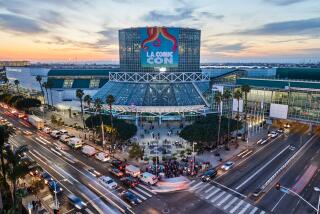Entertainment Expo Is Leaving Los Angeles
- Share via
Just a year after exploding on the scene as the hottest new trade show and bringing attention to Los Angeles as the best place for Hollywood glitz to meet high tech, the Electronic Entertainment Expo is leaving town.
The Interactive Digital Software Assn., dominated by such multimedia and video game giants as Nintendo and Sega Entertainment, is expected to announce soon a decision to move the show to Atlanta next year, according to Los Angeles Convention Center and game industry officials.
The industry has grown so much over the last year that when the show opens May 16 in Los Angeles for the second and last time, it will be forced to freeze out more than a third of the companies that applied for space.
“There are 230 companies on the waiting list, and we’ve already filled every inch” of the convention center, said Pat Ferrell, chief executive at Infotainment World, one of E3’s sponsors, explaining the decision to move.
The convention center, which was told of the move two months ago, has been scrambling to fill the gaping hole left by E3’s departure. The center faced a similar situation two years ago, when it lost the giant American Booksellers’ convention to Chicago.
The loss of E3 is particularly painful because Los Angeles’ large high-tech community, its Hollywood studios and its Pacific Rim location appeared to make it the ideal place for the high-profile event when it launched last year.
“You hate to see E3 leave,” said Dick Walsh, general manager of the convention center, arguing that E3’s location helped propel its astounding success in its first year as a trade show. “We think [Los Angeles] is the right venue for it. I honestly think they are making a mistake.”
While E3’s departure won’t diminish the importance of multimedia to the region, it could reduce the local industry’s international profile.
“The media attention the show gets, the national exposure, benefits the city of Los Angeles in establishing it as a leading multimedia center,” said Bobby Kotick, chief executive at Activision, a Los Angeles game maker.
The loss of E3 could hurt the city in other ways. Large conventions like E3 that attract 50,000 participants or more, many from outside the region, help fill cash registers at hotels, restaurants and stores.
Jack Kyser, chief economist at the Economic Development Corp. of Los Angeles, said E3’s loss is less traumatic than, say, a decision to move the Emmy or Grammy awards ceremonies would be. Still, he said, the departure underscores the importance of building a new sports complex and hotel near the convention center to add more activity to the area and to increase its capacity to host large events.
“Right now it’s down in no man’s land,” Kyser said. “Building more critical mass around the convention center will help develop business everywhere in Los Angeles.” Los Angeles County had 22 million visitors last year who spent $9 billion of “high-powered” money that generates economic activity without putting pressure on the infrastructure, Kyser said.
Atlanta, of course, is thrilled. Although E3 has not yet signed a formal contract to use Atlanta’s facilities--indeed, show sponsors would not officially confirm that a final decision on a move had been made--Henry Munford, director of marketing at the Georgia World Congress Center, said he expects a deal to be closed by the end of the week.
“I can’t imagine the top end of an E3 show,” said Munford, who pointed out that the convention center offers twice the exhibit floor space Los Angeles has to offer. “It will keep growing and growing and growing.”
Still, some executives believe the E3 sponsors could end up hurting the show by moving at a time when the industry is in turmoil. The consumer electronics show, from which E3 originally spun off, and Comdex, the largest computer show, are teaming together to host a similar show featuring multimedia technology in Atlanta next June that could draw away many exhibitors.
And with the interactive entertainment industry itself going through a massive consolidation, many believe that the number of participants in future shows could actually decrease.
Locating itself far from any multimedia businesses could also hurt. Kotick warned sponsors that Activision might pull out of the show if it moved to Atlanta. The company is considering putting on its own private show for retailers, the media and investment bankers to avoid the cost of sending 50 to 70 employees to Atlanta.
In spite of the long rivalry between Los Angeles and San Francisco over who has the bigger multimedia industry, even some San Francisco-based companies are joining their Los Angeles brethren in grumbling about the move.
“I’m pretty unhappy about it,” says Bing Gordon, executive vice president at San Mateo, Calif.-based video game giant Electronic Arts. Gordon notes that the bulk of industry activity takes place on the West Coast.






